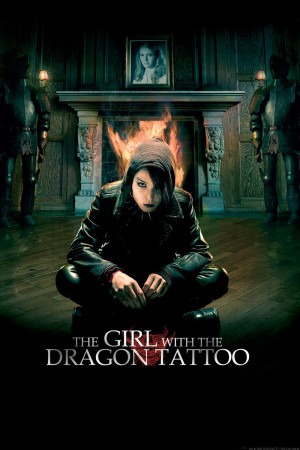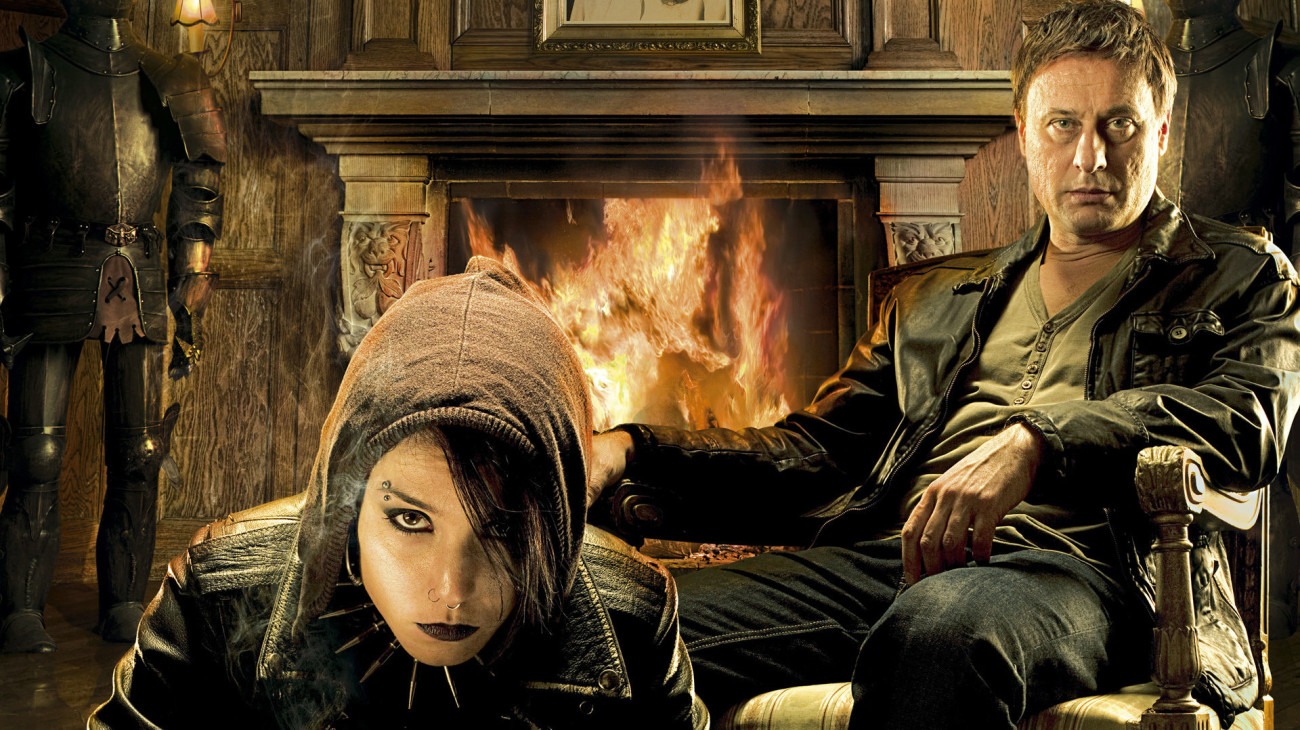
Miss Marple: The punk years
There came a point where I felt like I could no longer put off watching The Girl with the Dragon Tattoo on the hope that eventually, I'd get around to reading the late Stieg Larsson's massively popular international best-selling crime novel it's based on, so that's the first confession: I write from a position of relative ignorance. I don't know if the film is a faithful adaptation or a freewheeling one; and I don't know if its single biggest, indeed overwhelming flaw is something that could possibly have been avoided, given the source material. Here's what I do know: the film, written by Nikolaj Arcel and Rasmus Heisterberg, and directed by Niels Arden Oplev - primarily known for his work on police procedurals for Danish television - demonstrates with admirable skill and grace that even Sweden, not known internationally for the glossiness of its cinema, can give us a slick thriller with a surfeit of craftsmanship, rather more entertaining, perhaps, than it is memorable or "good".
For entertaining it certainly is. In brief, the story concerns a left-wing investigative reporter named Mikael Blomkvist (Michael Nyqvist), who has just been successfully framed for libel and sentenced to three months in prison. Before he's due to serve his term, he's approached by Henrik Vanger (Sven-Bertil Taube), the former head of a massive family-owned business concern, about investigating a 40-year-old disappearance: Henrik's niece, Harriet, who vanished in 1966 at age 16. Henrik is certain one of his numerous awful relatives killed her; Blomkvist's job is to find anything he can, to give the old man some measure of peace before he dies. Along the way, Blomkvist joins forces with a 24-year-old hacker and "researcher" - a security company spy - Lisbeth Salander (Noomi Rapace), who happens to be spying on his hard-drive, and finds herself instantly intrigued by the Harriet Vanger case.
At some point, what has looked for all the world like a standard-issue "amateur sleuths investigate a mystery" plot shifts smoothly into something else: something dark and strange, a character-driven chamber drama of sorts, where we find ourselves much more interested in the interactions of Blomkvist and Salander than in the case they're investigating. Especially Salander: played as all edges and snappish retorts by Rapace in an incredible turn that damn well ought to make a star out of her, the young hacker is an insoluble mystery that attracts Blomkvist, and by extension the audience, far more than the case of Harriet Vanger's disappearance (which has, in the event, a resolution that would be intensely aggravating and cheap if we cared about the story as a straightforward mystery). Perhaps I should not say insoluble; in fact we get the solution a little, though poor sad-sack Blomkvist doesn't.
Along the way, The Girl with the Dragon Tattoo - and might I point out that, whatever the book and novel are called in the anglophone world, the actual Swedish title, Män som hatar kvinnor, means, "Men Who Hate Women", which is a much different and more appropriate title - stops off for some probing looks at rampaging male ego and the sense of entitlement a certain kind of alpha male has over any woman who catches his eye. I can't go any further without traipsing all over major plot reveals, but there's no mistaking that it's about the terrible things that male desire can do to women, and the strong women who won't stand for being passive victims
The thing is: what about male entitlement and strong women? Here is where the film starts to break down a bit. I imagine that Larsson's novel probably spends a lot more time delving into sociology and the like, but Oplev and his writers are far too busy wrangling Larsson's massively complex story to do more than genuflect in the direction of thematic resonance. And yet, since that wrangling includes the identification of this idea of destructive male desire, without really paying it off very much, the time spent in the identifying - I am particularly thinking of Salander's entire function in the plot before she hooks up with Blomkvist - has the feel of padding. In the end, the film clocks in at a thick 152 minutes, and this is the overwhelming flaw I mentioned; it feels every second of that running time. At the same time, it doesn't seem like anything could possibly be cut, without damaging the story (and given the book's heft, I imagine quite a lot was cut already). So here's the Catch-22: the film plods along endlessly, but if you snipped it, it would either be incoherent or have absolutely no character and thematic resonance.
Maybe it's just that Oplev isn't a very good director. For all that The Girl with the Dragon Tattoo looks handsome, and sounds rich and epic, it's no better than competent, and sometimes, such as a montage in which Blomkvist reminds himself of the Vanger family's Nazi ties, it becomes laugh-out-loud silly. There's an urgency to the omnipresent darkness and grimness of the material that begins to feel overdetermined by the end; frankly, it came as no surprise to learn that Oplev was a television director, for his approach to everything has the unsubtle tang of the episodic procedural, where you have to get from A to B with maximum efficiency and minimum grace. Of course, I don't know jack about Danish cop shows, so maybe he's just a bad filmmaker. Whatever the case, he doesn't make the material sing: he presents it, and it just sort of sits there, and only the good story and the great performances keep it moving.
And so, back to where we started: it's a fun movie, but not more than that; and it's not hard to think of ways that it could have been even more fun, and maybe even meaningful. I dearly wish that it was 40 minutes shorter; but bloat isn't enough to wreck the story, nor to make watching the twists and turns play out any less than it ought to be. When worst comes to worst, we still have Rapace's intense, angry eyes staring at us; and whatever other flaws or merits the film has as a mystery and a character study, it's never less than mesmerising when she's onscreen.
7/10
For entertaining it certainly is. In brief, the story concerns a left-wing investigative reporter named Mikael Blomkvist (Michael Nyqvist), who has just been successfully framed for libel and sentenced to three months in prison. Before he's due to serve his term, he's approached by Henrik Vanger (Sven-Bertil Taube), the former head of a massive family-owned business concern, about investigating a 40-year-old disappearance: Henrik's niece, Harriet, who vanished in 1966 at age 16. Henrik is certain one of his numerous awful relatives killed her; Blomkvist's job is to find anything he can, to give the old man some measure of peace before he dies. Along the way, Blomkvist joins forces with a 24-year-old hacker and "researcher" - a security company spy - Lisbeth Salander (Noomi Rapace), who happens to be spying on his hard-drive, and finds herself instantly intrigued by the Harriet Vanger case.
At some point, what has looked for all the world like a standard-issue "amateur sleuths investigate a mystery" plot shifts smoothly into something else: something dark and strange, a character-driven chamber drama of sorts, where we find ourselves much more interested in the interactions of Blomkvist and Salander than in the case they're investigating. Especially Salander: played as all edges and snappish retorts by Rapace in an incredible turn that damn well ought to make a star out of her, the young hacker is an insoluble mystery that attracts Blomkvist, and by extension the audience, far more than the case of Harriet Vanger's disappearance (which has, in the event, a resolution that would be intensely aggravating and cheap if we cared about the story as a straightforward mystery). Perhaps I should not say insoluble; in fact we get the solution a little, though poor sad-sack Blomkvist doesn't.
Along the way, The Girl with the Dragon Tattoo - and might I point out that, whatever the book and novel are called in the anglophone world, the actual Swedish title, Män som hatar kvinnor, means, "Men Who Hate Women", which is a much different and more appropriate title - stops off for some probing looks at rampaging male ego and the sense of entitlement a certain kind of alpha male has over any woman who catches his eye. I can't go any further without traipsing all over major plot reveals, but there's no mistaking that it's about the terrible things that male desire can do to women, and the strong women who won't stand for being passive victims
The thing is: what about male entitlement and strong women? Here is where the film starts to break down a bit. I imagine that Larsson's novel probably spends a lot more time delving into sociology and the like, but Oplev and his writers are far too busy wrangling Larsson's massively complex story to do more than genuflect in the direction of thematic resonance. And yet, since that wrangling includes the identification of this idea of destructive male desire, without really paying it off very much, the time spent in the identifying - I am particularly thinking of Salander's entire function in the plot before she hooks up with Blomkvist - has the feel of padding. In the end, the film clocks in at a thick 152 minutes, and this is the overwhelming flaw I mentioned; it feels every second of that running time. At the same time, it doesn't seem like anything could possibly be cut, without damaging the story (and given the book's heft, I imagine quite a lot was cut already). So here's the Catch-22: the film plods along endlessly, but if you snipped it, it would either be incoherent or have absolutely no character and thematic resonance.
Maybe it's just that Oplev isn't a very good director. For all that The Girl with the Dragon Tattoo looks handsome, and sounds rich and epic, it's no better than competent, and sometimes, such as a montage in which Blomkvist reminds himself of the Vanger family's Nazi ties, it becomes laugh-out-loud silly. There's an urgency to the omnipresent darkness and grimness of the material that begins to feel overdetermined by the end; frankly, it came as no surprise to learn that Oplev was a television director, for his approach to everything has the unsubtle tang of the episodic procedural, where you have to get from A to B with maximum efficiency and minimum grace. Of course, I don't know jack about Danish cop shows, so maybe he's just a bad filmmaker. Whatever the case, he doesn't make the material sing: he presents it, and it just sort of sits there, and only the good story and the great performances keep it moving.
And so, back to where we started: it's a fun movie, but not more than that; and it's not hard to think of ways that it could have been even more fun, and maybe even meaningful. I dearly wish that it was 40 minutes shorter; but bloat isn't enough to wreck the story, nor to make watching the twists and turns play out any less than it ought to be. When worst comes to worst, we still have Rapace's intense, angry eyes staring at us; and whatever other flaws or merits the film has as a mystery and a character study, it's never less than mesmerising when she's onscreen.
7/10






